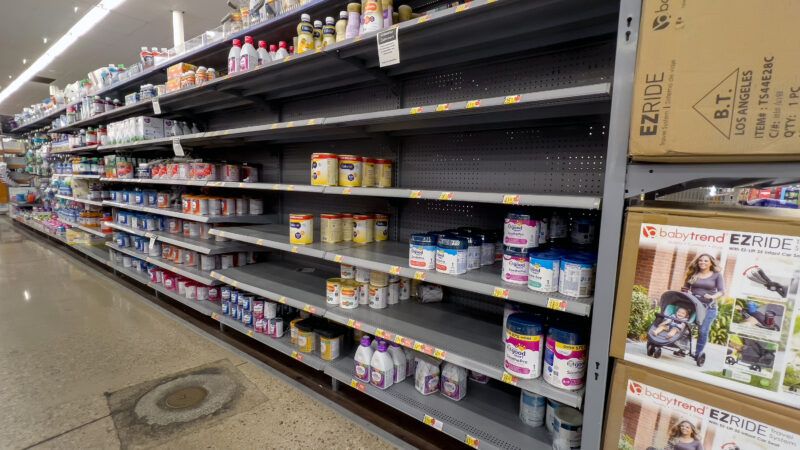Tariffs on Baby Formula Returned. So Did the Shortages.
Huh, what a wild coincidence.

When supply chain issues caused a baby formula shortage last year, Congress (eventually) cut tariffs to help get more formula onto American store shelves.
It worked! Imports of baby formula soared during the second half of 2022 after tariffs and other regulations were lifted. Stores reported lower out-of-stock rates and news stories about panicked parents being unable to feed their infants abated. In short, the government removed economic barriers and the market solved the problem.
Then, the government put those barriers back in place. On January 1, the tariffs on baby formula returned. Now, so has the crisis.
"It's getting harder and harder" to find baby formula, pharmacy owner Anil Datwani told Fox News this week. "[Mothers] go from one store to the next store to the next store" looking for baby formula.
Meanwhile, some consumers are complaining on social media that prices for baby formula have suddenly spiked and availability is once again a problem. A Forbes investigation into a recent increase in the price of Enfamil baby formula noted that the increases "follow the expiration of the U.S. government's suspension of infant formula tariffs in January, which opened the door for formula (both foreign and U.S.-produced) to become more expensive." (Another contributing factor: Reckitt Benckiser, the British-based company that owns the Enfamil brand, issued a recall in February affecting about 145,000 cans of formula.)
Because that's what tariffs do, of course. They are import taxes that protect domestic industries at the expense of domestic consumers, who are subjected to limited supply and higher prices as a trade-off for industrial protectionism.
"Families who use imported formula aren't the only ones who suffer because of these taxes," because the tariff-induced price increases create an opportunity for domestic producers to raise prices too, explains Reason contributor Bonnie Kristian in a piece at The Daily Beast. "For instance, if tariffs make the price of European formula go from $24 to $30 a jar, U.S. producers that might otherwise have charged $25 can hike their prices to $27. Even with the 'cheaper' American option, you're paying more."
It's obviously a bad deal for consumers, but one that's often invisible. The baby formula shortage has changed that and made the costs of this specific trade policy readily apparent.
It has also revealed the ways in which special interests pull the strings on many protectionist policies. In this case, it was the dairy industry, which benefits from the anti-competitive tariffs and other regulations that effectively prevent foreign baby formula from being sold in America. As Reason reported in December, the National Milk Producers Federation pushed Congress to reimplement the baby formula tariffs, arguing at the time that "the temporary production shortfall that gripped American families in need of formula earlier this year has abated."
Except, obviously, it hasn't.
Meanwhile, on Tuesday, the Food and Drug Administration (FDA) announced new plans to "increase the resiliency of the U.S. infant formula market," including new regulations, more inspections of manufacturing facilities, and an expedited review process for new products seeking to enter the market. The FDA also promised to examine "other factors that may influence the infant formula supply, such as tariffs and market concentration" but did not promise to take any particular steps in that direction.
The timing is convenient, as current and former FDA officials are being hauled before Congress this week to answer questions about the shortage and the agency's role in worsening it. The hearings are likely to once again highlight how the FDA's internal dysfunction led to delays in informing the public about the problems at the Abbott Nutrition plant in Michigan, which was shut down in early 2022 due to contamination, spurring the shortages.
The fact that the FDA has admitted it played a major role in creating the baby formula shortage in the first place but has steadfastly refused to hold anyone at the administration accountable for those mistakes should temper any expectations of positive changes.
The FDA has also backpedaled since the start of the new year. On January 6, it rescinded some of the measures adopted last year to allow foreign formula producers to sell their products in the United States. Now, only applications from foreign producers who intend to have a permanent presence in the U.S. market are being reviewed—potentially cutting off suppliers who might be able to help on a temporary basis.
More than a year after the baby formula shortage hit, the federal government is still struggling to figure out what should be blindingly obvious. Want a more resilient market? Let more producers compete on a level playing field—regardless of whether their products are made here or not.

Show Comments (82)